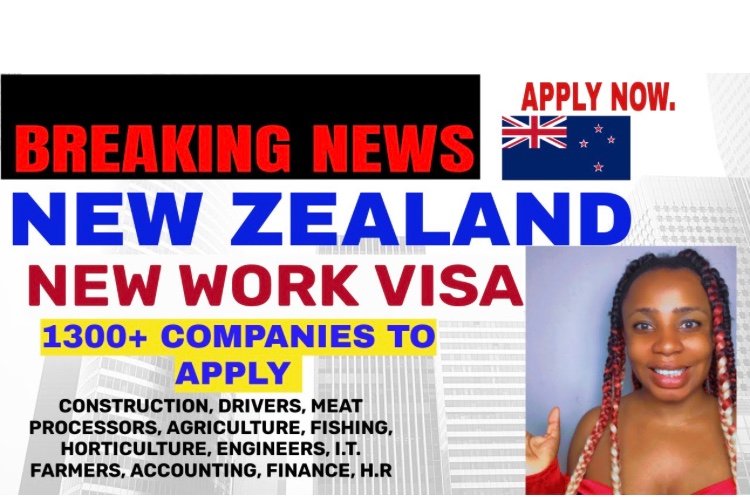
New Zealand is one of the most sought-after destinations for immigrants, particularly for those seeking employment opportunities in a stable and thriving economy. With its picturesque landscapes, high standard of living, and a reputation for welcoming people from all over the world, it is no surprise that many individuals look to move to New Zealand for work. However, to work in New Zealand, immigrants typically need to obtain a work visa, and for some, securing a visa sponsorship is a crucial step in the process.
This article will provide an in-depth look at New Zealand’s work visa system, the types of work visas available, how visa sponsorship works, and what potential immigrants need to know to navigate the visa application process.
Overview of New Zealand’s Work Visa System
New Zealand offers a range of work visa options to skilled professionals, temporary workers, and people seeking to bring family members along for their employment journey. The primary categories for work visas include:
Advertisements
Temporary Work Visas: These are for people who want to work in New Zealand for a specific period, typically up to three years. The most common type is the Essential Skills Work Visa, which allows foreign workers to take up employment in roles that cannot be filled by New Zealanders.
Skilled Migrant Category Work Visa: This visa allows skilled workers to live and work in New Zealand on a more permanent basis. Applicants can apply for residency through the Skilled Migrant Category after gaining enough points for factors like age, experience, and qualifications.
Accredited Employer Work Visa (AEWV): This is a relatively new visa introduced in 2022. It allows individuals to work for an accredited employer in New Zealand and is a pathway for long-term employment.
Work to Residence Visas: These are intended for individuals who want to stay in New Zealand permanently. They are for those who have a job offer from an accredited employer or those who meet the criteria for specific occupations in demand.
Post-Study Work Visa: After completing their studies in New Zealand, international students can apply for a Post-Study Work Visa, allowing them to gain relevant work experience in the country.
To work in New Zealand, you must have a job offer from an employer, meet the skills and experience requirements for the job, and prove that you are a good fit for the position. In most cases, the employer must also be willing to sponsor you for the visa.
Understanding Visa Sponsorship in New Zealand
Visa sponsorship is a process in which an employer in New Zealand takes on the responsibility of supporting a foreign worker’s visa application. Sponsorship is crucial for many work visas, particularly for temporary work visas like the Essential Skills Work Visa or the Accredited Employer Work Visa.
To be eligible for visa sponsorship, the employer must meet certain requirements set by the New Zealand government. They must typically demonstrate that they have a genuine need for a foreign worker and that they have made efforts to fill the position with local candidates before hiring from abroad.
For many employers, the sponsorship process is straightforward, but it does involve several steps and paperwork. Employers must apply to the New Zealand Immigration Service to become accredited. Once they are accredited, they can offer work to foreign nationals and sponsor them for specific work visas.
Employer Accreditation
To sponsor a foreign worker, the employer must first become an accredited employer with Immigration New Zealand (INZ). Accreditation is required for all businesses wishing to hire workers on a Work to Residence or Accredited Employer Work Visa. The accreditation process ensures that the employer meets New Zealand’s labor market standards and is genuinely offering employment to a skilled worker.
The accreditation process typically involves providing documentation that demonstrates the business’s financial stability, compliance with employment laws, and commitment to fair treatment of employees. Employers must also commit to providing fair wages and working conditions that meet or exceed New Zealand’s labor standards.
Employers who successfully complete the accreditation process are then able to offer a position to a foreign worker, who can apply for a visa with the support of their employer. In some cases, employers must also demonstrate that they have made efforts to hire New Zealand citizens or residents before recruiting from overseas.
Types of Work Visas that Require Employer Sponsorship
There are several types of work visas in New Zealand that require employer sponsorship. Some of the most common include:
- Essential Skills Work Visa
The Essential Skills Work Visa allows foreign workers to take up employment in positions that are not able to be filled by New Zealand citizens or residents. This visa is typically issued for a limited time (usually up to three years) and is employer-specific, meaning that the worker can only work for the employer who has sponsored them.
To be eligible for this visa, the applicant must have a job offer from a New Zealand employer in a position that matches their skills and qualifications. The employer must demonstrate that they have made efforts to hire New Zealand citizens or residents before offering the job to a foreign worker.
- Accredited Employer Work Visa (AEWV)
The Accredited Employer Work Visa is a relatively new visa introduced in 2022. This visa is for people who have a job offer from a New Zealand employer that is accredited by Immigration New Zealand. The AEWV is designed to ensure that only employers who meet certain standards can hire foreign workers.
This visa is issued for up to three years, and holders may also be eligible for a pathway to permanent residency through the Skilled Migrant Category or other visa pathways, depending on their occupation and situation.
- Work to Residence Visas
The Work to Residence visa is a pathway for people who want to live and work in New Zealand permanently. This visa is typically for workers who have a job offer from an accredited employer or who are in certain occupations that are in demand in New Zealand. Workers with this visa can transition to permanent residency once they meet certain requirements, such as working for the same employer for a specific period.
- Silver Fern Job Search Visa
Although it is less common today, the Silver Fern Job Search Visa was previously a popular option for young, skilled workers seeking to find employment in New Zealand. While it no longer exists in its original form, New Zealand has introduced various job-search visa categories that offer opportunities to young workers to come to the country and seek employment.
How to Apply for a New Zealand Work Visa with Sponsorship
Applying for a New Zealand work visa with sponsorship involves several important steps. The process can be complex and requires careful attention to detail. Below is an overview of the typical steps involved in applying for a work visa with employer sponsorship.
Step 1: Find a Job in New Zealand
Before you can apply for a work visa, you must first secure a job offer from a New Zealand employer. Depending on the type of visa you are applying for, the employer may need to be accredited with Immigration New Zealand. It’s also essential to ensure that the position matches your skills and qualifications and that it cannot be filled by a New Zealand citizen or resident.
Step 2: Employer Becomes Accredited
If your employer is not already accredited, they must apply for accreditation through Immigration New Zealand. The accreditation process includes submitting documentation proving the employer’s financial stability, adherence to labor laws, and willingness to offer fair pay and working conditions.
Step 3: Submit Your Visa Application
Once your employer is accredited (if necessary) and you have received a formal job offer, you can apply for a work visa. Depending on the visa you are applying for, this may involve submitting various documents, including your job offer letter, proof of qualifications and experience, health and character assessments, and more.
Step 4: Wait for Visa Approval
Once your application has been submitted, it will be reviewed by Immigration New Zealand. The processing time can vary, but it generally takes several weeks to a few months for a decision. During this time, Immigration New Zealand may request additional documentation or information.
Step 5: Receive Your Visa
If your application is approved, you will receive your work visa. This visa will typically be tied to your employer, meaning that you are authorized to work only for that employer during the duration of your visa.
Benefits of Having Employer Sponsorship for a Work Visa
Having employer sponsorship for a work visa in New Zealand comes with several benefits:
Legal Work Status: The primary benefit is that it allows you to work legally in New Zealand. Without a work visa, you cannot work for any employer in the country.
Access to a Stable Job Market: With a job offer from an accredited employer, you gain access to New Zealand’s job market, which is known for its high standards and employee benefits.
Pathway to Permanent Residency: Many work visas, such as the Accredited Employer Work Visa and Work to Residence Visas, provide a pathway to permanent residency. This can allow you to settle in New Zealand long-term and enjoy all the benefits of being a resident.
Support from Employer: Your employer’s sponsorship means that they will likely assist with the visa application process, which can ease some of the complexities of navigating immigration requirements.
Potential for Family Sponsorship: In many cases, the holder of a work visa can also sponsor their family members (spouse and children) to join them in New Zealand.
Challenges in the Sponsorship Process
While obtaining a work visa with employer sponsorship in New Zealand has many benefits, there are challenges that applicants should be aware of:
Employer’s Responsibility: The employer must go through the accreditation process and meet New Zealand’s standards for hiring foreign workers. This can be time-consuming and may involve costs for the employer.
Visa Limitations: Many work visas are employer-specific, meaning that workers can only work for the sponsoring employer. Changing employers or jobs may require a new visa application, and in some cases, may not be allowed.
Job Market Competition: New Zealand’s labor market is competitive, and not all job offers are guaranteed to result in visa approval. Immigration New Zealand may also impose limits on the number of foreign workers hired in certain industries or regions.
Conclusion
New Zealand’s work visa system provides an excellent opportunity for skilled professionals and workers to live and work in the country, contributing to its dynamic economy and diverse society. Employer-sponsored work visas are a key component of this system, and securing sponsorship can be an essential step for many immigrants seeking employment in New Zealand.
However, obtaining a work visa and securing employer sponsorship requires careful planning, a solid job offer, and compliance with New Zealand’s immigration laws. It’s important for both employers and employees to understand the visa requirements, the accreditation process, and the steps involved to ensure a smooth and successful immigration journey.
For those who are successful in obtaining a work visa, New Zealand offers not just a job but the chance to experience a high quality of life, beautiful landscapes, and a supportive and inclusive culture.
Advertisements
